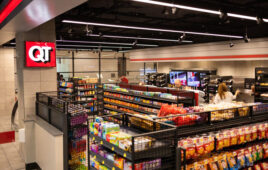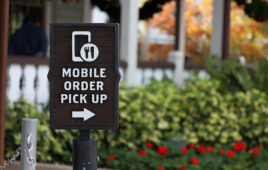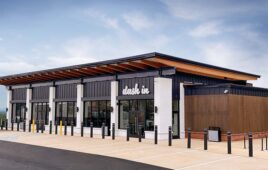Tesoro Corp. has undergonea transformation through theyears from a small local refinerto a multi-state marketer thats willingto take risks to grow the business.
Over the past eight years the San Antonio-based refiner has become a full-service marketer with thriving retail, wholesale and commercial marketing programs. It has also proved to be an innovator and risk-taker developing its own 2Go convenience store concept, a popular customer loyalty program and investing heavily in interactive security programs.
Aided by a series of small acquisitions through the years, Tesoros assets now include six refineries in the Western U.S. with a combined capacity of nearly 560,000 barrels per day. Tesoros retail marketing system includes almost 500 branded retail stations, of which 220 are companyowned and operated.
But not all of those efforts to grow the business have been home runs, such as its alliance with Wal-Mart to develop the Mirastar fuel brand. Wal-Mart last year announced plans to eschew branding partnerships and launch its own fuel brand.
Tesoro has 77 Mirastar outlets in the Rockies and on the West Coast, but has struggled to turn a profit onthose properties. The new Wal-Mart brand, if the big-box operator decides to pursue it, would replace many of the parking lot stations originally destined for Mirastar or Optima (an East Coast brand with Sunoco) sites.
What happens to the legacy Optima or Mirastar sites is still subject to negotiation, according to sources. Ironically, Tesoro could still supply some of the sites when the new Wal-Mart outlets are put up for gasoline supply bids.
As Tesoro continues to grow, security is playing a bigger role in its success. Ensuring the safety at 220 corporate stores and thousands of employees requires a Herculean effort by a group of skilled professionals. Charged with leading this effort at Tesoro is Frank Coletta, manager of safety and loss prevention.
Coletta is hardly an amateur. He is a by-the-books manager who prefers to lead with his experience when it comes to keeping employees safe. He served in law enforcement for more than 15 years before moving over to corporate security in 1998.
Tesoro is utilizing several security strategies that have helped the company record an impressive safety record and consistent year-over-year reductions in robberies and beer runs. Among them are interactive security monitoring with Westec Interactive, time-delay drop safes and a non-resistance policy when it comes to robberies.
Some people may not understand the logic behind non-resistance, but its really very simple: No ones life is worth the money that is kept in the cash register. If employees are following our guideline of keeping minimal amounts of money in the cash registers, any attempted robbery is going to yield very little money, Coletta said. Thieves know where the potentially big scores are. Following this policy lets the bad guys know ourstores arent worth the effort.
Coletta discussed with Convenience Store Decisions his views on security and the strides the industry has made over the past 10 years to keep employees safe.
CSD: What are the first steps retailers should take when implementing a security strategy?
For starters, there are a number of robbery deterrents that have become standard in the industry such as ensuring clear visibility in and out of the store, good lighting, cash control and timecontrol safes. They must be followed. But there are other factors, such as examining the entire lot and blocking offpotential escape routes. Its important to use obstacles like fencing as a deterrent.
CSD: How do you know these theories are effective?
Back in the 1970s, researcher Rosemary Erickson got a grant to do research on crime in convenience stores. She interviewed dozens of convicts in prison for robbing c-stores and found out precisely what they are looking for and she ranked them in order. What she learned was that the amount of cash available in the register was the primary driver of convenience store crime.
Over the years she refreshed her study and found that escape routes has become the most important factor, followed by cash levels and a crooks ability to pull off a crime and remain anonymous. So its important to train your employees to make eye contact with everyone that walks through the door even if its just for a few seconds.
CSD: What steps should clerks take if they do get robbed?
One thing we do is adhere to a strict noresistance policy. This means if we get robbed we dont resist, we give them the money. People are more important than property. In cases where there is resistance, employees are far more likely to get injured, not only in a robbery situation, but also in other types of crimes.
CSD: Doesnt that encourage crime?
Not really because the theory is that if you manage cash control, crooks will realize the store isnt worth the effort. Theres a network of communication among the bad guys. If one of them goes to a Tesoro and they get $250, word of that score is going to spread. That store is going to be a target and it increases the odds of being robbed again. But if they go in and get less than $50, they might go and try to find some place better.
Theres also a risk factor involved. Lets say someone robs a store with a knife and gets $40. If they get caught theyre facing significant jail time for armed robbery over $40. Its not worth it for them. If there is a downside to this policy its that it tends to encourage others thefts like beer runs, which is basically when young people come in and grab a case of beer or a carton of cigarettes and run out of the store with it.
CSD: Have employees ever violated the no-resistance policy?
Sure. We have terminated people for resisting. We had a guy who intervened in a robbery when he shouldnt have and he tied a would-be thief up with Scotch tape. The employee thought he was doing the right thing and, to be honest, we gave him another chance, but he acted similarly in another situation and we decided his behavior could not be tolerated. He put himself and other employees at risk and, as a result, the guy doesnt work for us any more.
CSD: Are beer runs on the rise?
The number of incidents is on the rise, but they are not always reported to the police. Its becoming a significant problem for us and other operators at a time when gasoline drive-offs are also on the rise.
CSD: What are the benefits of interactive security? Does the sense of safety it provides help with recruiting for the difficult to staff overnight hours?
The employees like it. They get a sense of security, especially if they work alone. The real benefit of interactive security is that it doesnt get in the way of customer service, and its always working. If there is ever a problem an employee simply pushes a button and somebody will look in on them.
But it also serves as a deterrent. Many times it discourages swarms of juveniles coming in at once. If a clerk feels overwhelmed, they can press a button and a live person looks in the store and canmake a security announcement. It is very impressive and can discourage shoplifting and other crimes.
CSD: Has the interactive security system produced a quantifiable reduction in crime?
Shrink at our stores is steadily decreasing. Statistics show that more than two-thirds of shrink comes from employees and interactive security has been an excellent investigative aid for internal theft.
However, it has
limitations because you cant have cameras everywhere. Theres always going to be a blind spot, and employees know that. When it comes to loss prevention, 10% of the people will never steal no matter what the temptation, 10% will steal no matter what you do and 80% that can be persuaded to steal if the right opportunity presents itself. The deterrent factor helps keep everyone honest.
CSD: Is the system helpful in preventing driveoffs?
Drive-offs, like beer, are costing the industry millions these days especially with higher gas prices. The possibilities with video surveillance are just tremendous, if you have the money to spend on it. You can get pan tilt and zoom cameras, which allow you to remotely control the camera position for a close up picture of activity. I am not certain whether the system actually deters drive-offs.
CSD: How is the industry doing overall on security?
I think its much better now than in the past, especially with larger operators. They are becoming more knowledgeable and technology has become readily available and more affordable.
CSD: What are some of the mistakes most commonly made and what can be doen to address them?
Since decisions come from the top down, more executives have paid attention to increasing visibility in and out of the store. Youre not seeing those big six-foot signs advertising milk that takes up the whole window anymore.
Other problems are keeping too much cash on hand and having a weapon behind the counter. A lot of owners have invested their lives into their store and their first inclination is to protect it, but no ones life is worth the $150 they are keeping the register.




